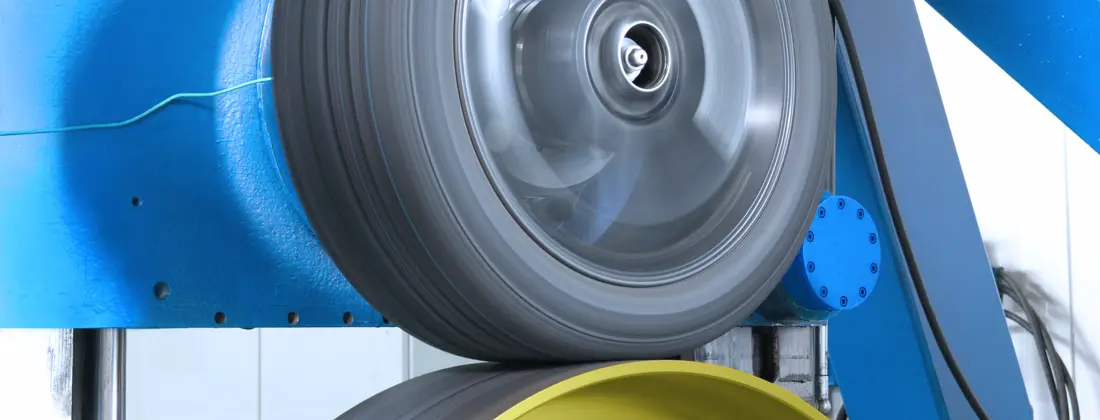AIS 037 Passenger Car Tyre High Speed Test India
The AIS (Automobile Industry Standards) 037 Passenger Car Tyre High Speed Test is a critical procedure conducted to evaluate the high-speed performance of tyres used in passenger vehicles. This test is essential for ensuring tyre safety, durability, and reliability under high-speed conditions, which are prevalent in modern driving scenarios.
The primary purpose of this test is to assess how well a tyre performs at speeds exceeding 180 km/h (approximately 112 mph). The procedure aims to mimic real-world driving conditions where high-speed manoeuvres occur. This includes sudden accelerations, braking, and cornering at such velocities.
In the automotive sector, passenger car tyres are subjected to rigorous testing before they can be approved for market sale. The AIS 037 test is a key part of this process. It ensures that tyres meet stringent standards set by regulatory bodies like AIS in India. Compliance with these standards not only enhances consumer safety but also supports the broader automotive industry's reputation.
The high-speed test involves several critical parameters including temperature, pressure, and load distribution during acceleration and deceleration phases. These factors are crucial in assessing a tyre’s ability to maintain grip, stability, and comfort at extreme speeds.
For R&D engineers, this test offers valuable insights into improving tyre design for better performance. The data collected can help identify areas of improvement such as tread compound composition, reinforcement layers, and overall construction. Quality managers and compliance officers rely on the results to ensure that tyres meet all required specifications before they reach the market.
From a practical standpoint, this test is not only about meeting regulatory requirements but also ensuring brand reputation and customer trust. In an era where safety is paramount, consumers expect tyres to perform reliably even at high speeds. Thus, manufacturers invest heavily in testing procedures like AIS 037 to ensure their products meet these expectations.
The significance of this test extends beyond just compliance with standards; it plays a crucial role in enhancing overall vehicle performance and passenger comfort. By focusing on high-speed scenarios, the test helps identify potential issues early in the product development lifecycle, allowing manufacturers to address them before the tyres go into production.
Why It Matters
The AIS 037 Passenger Car Tyre High Speed Test is vital for several reasons. Firstly, it ensures that passenger car tyres are safe and reliable under high-speed conditions, which can be particularly challenging due to factors like increased friction, heat generation, and stress on the tyre components.
- Enhances safety by preventing accidents caused by tyre failure at high speeds.
- Improves durability and longevity of the tyres, extending their useful life significantly.
- Promotes brand reputation and customer satisfaction through consistent product quality.
The test also aids in compliance with international standards such as ISO 18903 and AIS (Automobile Industry Standards) which mandates this specific testing procedure. Compliance is not just about meeting legal requirements but ensuring that the products are of high quality, which ultimately benefits both manufacturers and consumers.
Scope and Methodology
| Parameter | Description | Test Conditions |
|---|---|---|
| Tyre Speed | 180 km/h (minimum) to 240 km/h (maximum) | Continuous operation for a specified duration at the highest speed. |
| Temperature | Tested within an ambient temperature range of 25°C ± 3°C | Temperature is monitored and recorded continuously to ensure accuracy. |
| Load | Standard load as per the tyre’s weight-carrying capacity rating | Loading is applied uniformly across all four tyres simultaneously. |
The AIS 037 Passenger Car Tyre High Speed Test involves subjecting a set of tyres to sustained high-speed conditions. The testing apparatus includes specialized test rigs capable of simulating real-world driving scenarios accurately. These rigs are equipped with sensors that continuously monitor various parameters such as speed, temperature, and load distribution.
The process begins by selecting the appropriate tyre model according to the standards specified in AIS 037. Once selected, each tyre undergoes thorough inspection and preparation, ensuring there is no damage or defects before testing commences. During the test run, engineers closely monitor all critical parameters using advanced software systems integrated into the test rigs.
The data collected during these tests provides detailed insights into how well the tyres perform under high-speed conditions. This information is invaluable for both manufacturers and consumers alike as it helps in making informed decisions regarding tyre selection and usage. It also aids in continuous improvement efforts aimed at enhancing tyre performance further over time.
Competitive Advantage and Market Impact
- Innovation Leadership: Compliance with AIS 037 ensures that a company stays ahead of competitors by providing safer, more reliable tyres.
- Better Customer Satisfaction: High-quality products lead to higher customer satisfaction rates which translate into loyal customers and positive brand perception.
- Regulatory Adherence: Meeting these rigorous standards helps avoid potential legal issues associated with non-compliance.
- Market Differentiation: By offering tyres that exceed basic regulatory requirements, companies can differentiate themselves from competitors in the market.
The AIS 037 Passenger Car Tyre High Speed Test has a significant impact on the market. It sets a benchmark for tyre manufacturers to strive towards excellence. Compliance with these standards not only enhances product quality but also contributes positively towards environmental sustainability by promoting efficient use of resources and energy.





